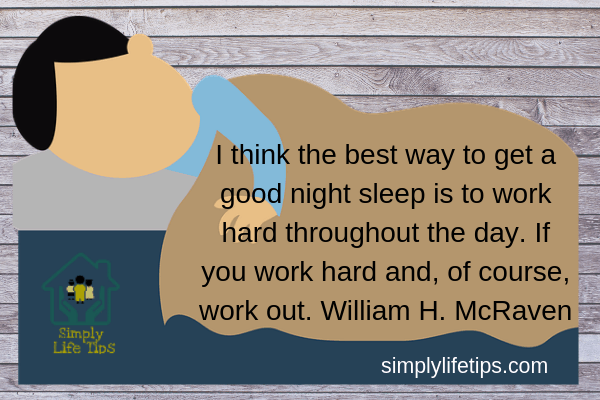Are you struggling to get better sleep at night? Getting a good sleep at night is crucial for overall well-being and health. Unfortunately, many people struggle with sleep-related issues, such as insomnia, poor sleep quality, or difficulty falling asleep. If you find yourself tossing and turning at night, you’re not alone. However, there are several strategies and habits you can adopt to improve your sleep and wake up feeling refreshed and rejuvenated. In this article, we will explore 10 tips for getting better sleep at night.
Better Sleep At Night
You may have encountered individuals expressing their struggles with nighttime sleep. For some, slumber only arrives well past midnight or in the early morning hours, leaving them tossing and turning in bed until then. A multitude of factors can contribute to this issue, including physical health ailments, mental stress, and family-related concerns, to name a few.
While a few restless nights are a common occurrence and often not cause for alarm, persistent sleep disturbances warrant attention. If you find yourself grappling with ongoing sleep problems, it’s advisable not to disregard them. Seeking the guidance of a healthcare professional is a proactive step to uncover the underlying causes and work toward effective solutions. A doctor can identify the root of the problem and offer strategies to help you overcome your sleep challenges.
10 Tips To Get Better Sleep At Night
1. Maintain A Consistent Sleep Schedule
One of the most effective ways to improve your sleep is to stick to a regular sleep schedule. Try to go to bed and wake up at the same time every day, even on weekends. Consistency helps regulate your body’s internal clock, making it easier to fall asleep and wake up naturally.
Ultimate Sleep Routine For High Performance
2. Create A Relaxing Bedtime Routine
Establish a calming bedtime routine that helps signal to your body that it’s time to wind down. This can include activities like reading a book, taking a warm bath, or practising relaxation techniques such as deep breathing or meditation. Avoid stimulating activities like watching TV or using electronic devices just before bedtime.
How To Get Better Quality Sleep At Night
3. Make Your Sleep Environment Comfortable
Your sleep environment plays a crucial role in the quality of your sleep. Ensure your bedroom is conducive to sleep by keeping it cool, dark, and quiet. Invest in a comfortable mattress and pillows, and remove any distractions that may disrupt your sleep, such as excessive noise or light.
4. Limit Exposure To Screens Before Bed
The blue light emitted by smartphones, tablets, and computers can interfere with your body’s production of melatonin, a hormone that regulates sleep. Aim to avoid screens at least an hour before bedtime to promote better sleep quality.
5. Watch Your Diet
What you eat and drink can have a significant impact on your sleep. Avoid caffeine and heavy meals close to bedtime, as they can disrupt your sleep patterns. Instead, opt for light, sleep-friendly snacks if you’re hungry before bed.
What Are The Best Foods For Sound Sleep Through The Night
6. Get Regular Exercise
Regular physical activity can help you fall asleep faster and enjoy deeper sleep. However, avoid vigorous exercise right before bedtime, as it can have the opposite effect. Aim to finish exercising at least a few hours before hitting the hay.
7. Manage Stress
Stress and anxiety can be major culprits behind poor sleep. Practising relaxation techniques, like mindfulness, yoga, or progressive muscle relaxation, can help manage stress and calm your mind, making it easier to drift off to sleep.
How To Reprogram Your Subconscious Mind Before You Sleep
8. Limit Naps
While short power naps can be refreshing, long daytime naps can disrupt your nighttime sleep patterns. If you need to nap during the day, keep it short, ideally around 20-30 minutes.
9. Be Mindful Of Your Sleeping Position
The way you sleep can impact the quality of your rest. If you snore or frequently wake up with aches and pains, it might be time to experiment with the best sleeping positions. Generally, sleeping on your back or side is recommended for better sleep and less strain on your body.
Sleep Posture During Pregnancy
10. Seek Professional Help If Needed
If you’ve tried various strategies and still struggle with sleep problems, consider consulting a healthcare professional or a sleep specialist. They can help diagnose underlying sleep disorders and provide you with appropriate treatment options.
Sleep Disorders And Mental Health: Effects And Solutions
In the long term, insomnia is also associated with anxiety and depression.
“Control what you can control. Don’t lose sleep worrying about things that you don’t have control over because, at the end of the day, you still won’t have any control over them.”
Cam Newton
Good Sleep For Good Health: Achieving Optimal Well-Being
Final Thoughts
In conclusion, persistent sleep troubles can be a frustrating and exhausting experience. While many factors can contribute to these difficulties, it’s essential not to simply endure them. Seeking professional help is a crucial step toward understanding the reasons behind your sleep issues and finding effective solutions. Remember, a good night’s sleep is essential for your overall health and well-being, so don’t hesitate to consult a doctor if you’re facing ongoing sleep problems. A peaceful night’s rest is well within reach, and addressing your sleep concerns is the first step toward achieving it.
How Can Decrease Belly Fat With Proper Sleep?
What do you do for a good sleep at night?
I appreciate your visit. I trust you found the post enjoyable.
Remember, Sharing Is Caring! Feel free to share this post on your social media and other networks to help others discover it.
PVM

Mathukutty P. V. is the founder of Simply Life Tips. He is a Blogger, Content Writer, Influencer, and YouTuber. He is passionate about learning new skills. He is the Director of PokketCFO.
He lives with the notion of “SIMPLE LIVING, CREATIVE THINKING”. He Believes – “Sharing is caring.” and “Learning never ends.”




